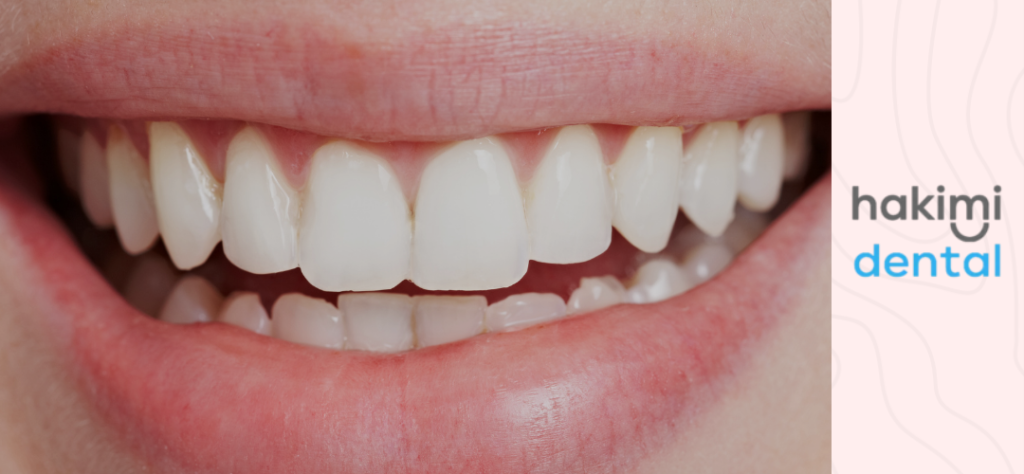Revitalise Your Smile: A Blog about Tooth Enamel Care
Tooth enamel, often overlooked, is a fundamental component of our dental health. As the hardest substance in the human body, enamel acts as a defence shield for our teeth against daily wear and tear, bacteria, and acidity.
But what happens when this shield weakens? Can tooth enamel grow back, and if not, how can we restore and protect what’s left? This blog analyses tooth enamel, offering insights into its restoration and care.

Understanding tooth enamel
Tooth enamel, often perceived merely as a hard surface, is in fact a marvel of biological engineering. It’s a highly mineralised, translucent layer that meticulously covers the crown of your teeth, the part visible above the gum line. This enamel is the first line of defence against various oral health threats.
But enamel isn’t just about hardness. Its translucency plays a crucial role in the aesthetics of your smile. The underlying dentin, which is yellower in colour, is masked by the semi-translucent enamel, giving your teeth their white appearance. This interplay of translucency and colour is what cosmetic treatments often aim to enhance.
Enamel is critically important in protecting your teeth from decay. It acts as a barrier against the barrage of bacteria present in the mouth. These bacteria, if left unchecked, produce acids that can erode and damage the teeth. Enamel’s hard surface is resistant to these acids, thereby preventing decay, at least until its integrity is maintained.
Can tooth enamel grow back?
Despite its toughness, enamel isn’t indestructible. It lacks the ability to regenerate, meaning that once it’s damaged, the body can’t naturally repair it.
This vulnerability is compounded by the fact that enamel doesn’t contain any living cells, making it incapable of self-repairing like other tissues in the body. Therefore, it’s imperative to maintain good oral hygiene and regular dental care to preserve this vital layer.
How to restore tooth enamel naturally?
Understanding that tooth enamel cannot regenerate once it’s lost, it becomes paramount to focus on preserving and reinforcing the enamel we have. By adopting certain practices and making lifestyle adjustments, we can effectively safeguard our enamel, ensuring it remains as resilient as possible.
Fluoride is key
Fluoride, a naturally occurring mineral, is instrumental in the fight against tooth decay and is crucial for the remineralisation process of enamel. This process involves fluoride depositing minerals onto the enamel layer, which has been eroded by acids.
Regular use of fluoride toothpaste and mouthwash is highly recommended. These products create a protective layer on your teeth, fortifying the enamel against acid attacks from food and bacteria. It’s important to check the fluoride content in your oral hygiene products and ensure they are at an effective level.
Mind your diet
The role of diet in enamel health cannot be overstated. Foods rich in calcium and phosphorus, such as dairy products (milk, cheese, yogurt), nuts, and lean meats, play a vital role in repairing and maintaining enamel. These nutrients act by replenishing the minerals in the enamel and thereby strengthening it.
Conversely, acidic foods and drinks, including citrus fruits, tomatoes, and carbonated beverages, can gradually erode enamel. This erosion occurs as the acid in these foods wears away the mineral structure of the enamel, leading to weakening and potential decay. It’s not just about avoiding these foods, but also about how you consume them. Eating acidic foods as part of a meal rather than alone can reduce their impact. Moreover, rinsing your mouth with water after consuming acidic foods or drinks can help wash away lingering acids, thus reducing their erosive effect.
Regular dental checkups
Routine dental visits are vital for maintaining healthy enamel. Dentists recommend check-ups at least twice a year, though some individuals may require more frequent visits depending on their dental health status. During these visits, dentists can perform professional cleanings that remove plaque and tartar build-up, which if left untreated, can lead to enamel erosion.
Dentists also have a keen eye for spotting early signs of enamel wear or erosion. Early detection is crucial in preventing further damage and implementing protective measures.
3 tips for addressing weak tooth enamel
Dealing with weak enamel requires a proactive approach:
Gentle brushing technique: Hard brushing can further damage enamel. Use a soft-bristled toothbrush and gentle motions to avoid aggressive abrasion.
Enamel-strengthening products: Many toothpaste brands offer products specifically designed to strengthen weak enamel. These typically contain higher concentrations of fluoride and other minerals.
Stay well-hydrated: Saliva is nature’s way of bathing the teeth in a protective, remineralising fluid. Staying hydrated ensures a healthy flow of saliva, which is crucial for enamel health.
Conclusion
Tooth enamel, though not regenerative, can be effectively protected and strengthened with the right care. Regular dental visits, a balanced diet, and proper oral hygiene are your best defences against enamel erosion. By understanding the importance of tooth enamel and adopting preventive measures, you can maintain a healthy, resilient smile.
FAQs
Signs of enamel erosion include increased sensitivity to hot or cold foods, discolouration, and visible cracks or chips. If you notice these symptoms, it’s time to see your dentist.
Children’s enamel is more susceptible to decay, as it’s softer and less mineralised compared to adults. Good oral hygiene and regular dental check-ups are essential for protecting children’s enamel.
While natural remedies cannot regrow enamel, a diet rich in calcium and vitamin D, along with good oral hygiene, can help maintain and strengthen existing enamel.
While completely restoring eroded enamel is not possible, steps can be taken to strengthen the remaining enamel and prevent further erosion.
